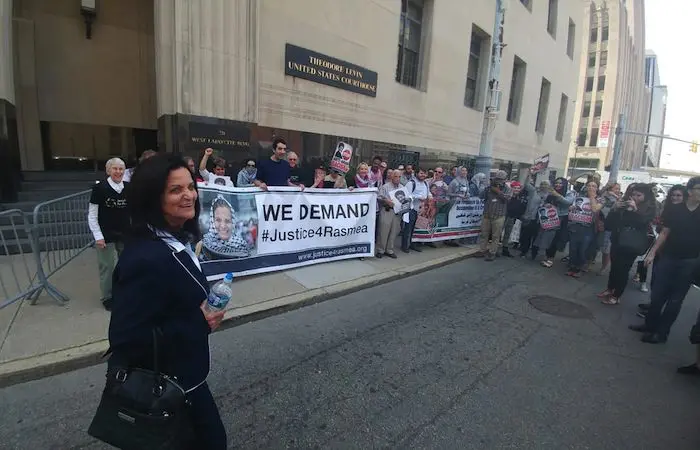
|
| Odeh greeted by her supporters after the court hearing, June 13 |
DETROIT —Rasmea Odeh’s supporters celebrated the return of her case to Detroit on Monday as a victory. The Palestinian activist is likely to get a new trial that would start on Jan. 10.
About 100 activists protested in front of the federal courthouse in Detroit, as Odeh and her defense team appeared in front of the judge to discuss the admissibility of a psychological expert’s testimony.
Odeh was found guilty of lying on her naturalization application for failing to disclose that she was convicted for taking part in a bombing in Israel in 1969. However, she maintains the conviction in Israel was based on a forced confession obtained by rape and torture.
Her defense had planned to argue that Odeh suffers from Post Traumatic Stress Disorder because of the torture she endured. According to defense attorney Michael Deutsch, PTSD affected Odeh’s perception of the questions; she answered “no” because she has never been arrested or convicted of a crime in the United States.
The Sixth Circuit Court ruled in February that the U.S. District Court in Detroit was wrong in excluding a psychological expert’s testimony about the effects of PTSD, which Odeh’s attorneys say is essential to her defense.
The legal case, along with Odeh’s supporters, returned to Detroit’s federal court for the first time since the sentencing hearing in March of last year, when Judge Gershwin Drain ordered Odeh to a year and a half in jail followed by deportation. Odeh remained free on bond during the appeal process.
Deutsch said he is confident that Odeh will get a new trial, adding that Judge Drain is leaning towards accepting the PTSD-related evidence.
At a press conference in front of the courthouse, Deutsch announced that Jonathan Tukel, the assistant U.S. attorney who led Odeh’s prosecution, is no longer on the case. The crowd cheered the news.
Muhammad Sankari, a member of the Rasmea Defense Committee, welcomed Tukel’s absence.
“Tukel is a right wing ideologue and a Zionist, whose political beliefs can best be highlighted by his own words calling Rasmea’s supporters ‘mobs’ and ‘hordes’ in official court documents simply because we are Arabs and Palestinians and were waving Palestinian flags,” Sankari said, referring to a legal briefing where Tukel tried to convince the judge to ban pro-Odeh protests in front of the courthouse.
“Regardless of the reasoning, we are happy that he was removed from the case.”
The U.S. attorney’s office in Detroit did not return The Arab American News’ request for comment on Tukel’s removal.
A diverse group of protestors chanted enthusiastically for Odeh’s freedom.
Kristian Bailey, an activist who traveled on an African American solidarity delegation to Palestine last year, drew parallels between the Black and the Palestinian struggles.
“Water is under is under attack in Detroit, is under attack in Flint, is under attack in Palestine where they try to control resources that are for everybody in order to police our lives,” he said.
Bailey added that Odeh is “one of our people” because she is fighting for justice and liberation.
“Rasmea’s case in particular brings to mind the connections that we see in systems of incarcerations in Palestine and here in the United States, where incarceration is used as a tool to police our communities, to make us afraid to resist,” he said.
A critical hearing on the psychological expert’s testimony is set for November 29.
Deutsch requested easing Odeh’s travel restrictions and reporting requirements while she remains free on bond.
After the court session, Odeh was given a hero’s welcome, with the crowd chanting her name.
She thanked her supporters, offering particular gratitude toward Chicago women who traveled to Detroit while fasting.






Leave a Reply